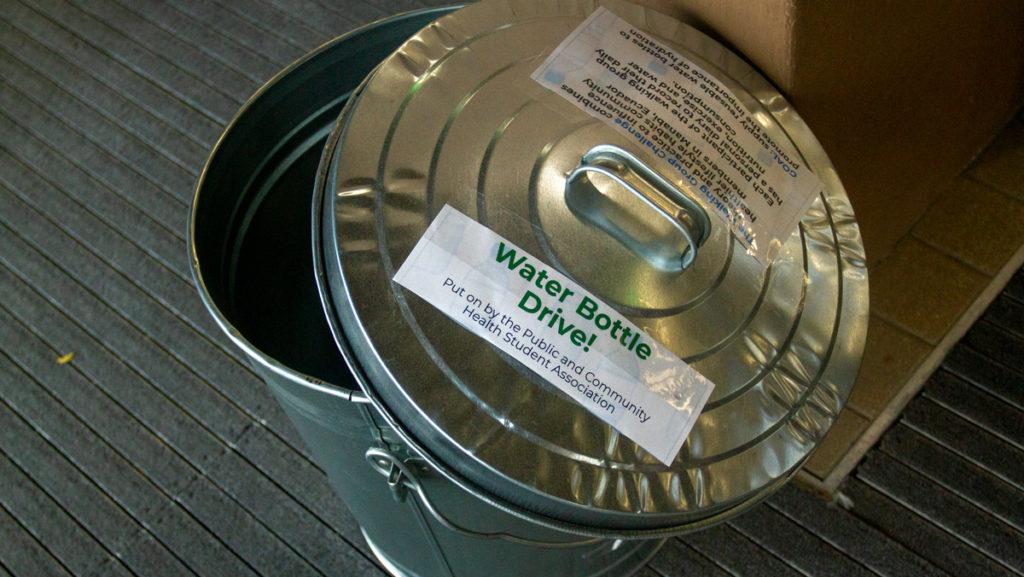A group of students at Ithaca College is looking to make a global difference through local efforts.
The Public and Community Health Student Association is collecting and then shipping reusable water bottles across the world to a community in Ecuador. The group is working with the Walking Group Challenge, a community-based program that encourages participants in Manabi, Ecuador, to adopt healthy living styles by logging food and water intake, increasing exercise and increasing mental activity through games like Scrabble and bingo. All reusable water bottles collected during the drive will be sent to Ecuador for program participants to use. The Walking Group Challenge was organized by Donette Ritchie ’14, who majored in public and community health and currently works with the Peace Corps.
Students who would like to donate reusable water bottles can leave them in buckets located in the upper level of the Campus Center and outside the library. The bottles can be new or used and will be collected at least until the end of the semester.
Senior Charlotte Hadley, president of the association, said her Front Page Public Health class skyped with Ritchie, who told them about the work she was doing in Ecuador through the Peace Corps. Ritchie suggested that the club help with her work, so the executive board organized the water bottle drive.
Senior Margaret Heilshorn, treasurer of the association, said Ritchie’s suggestion of a water bottle drive was perfect for the campus.
“We thought, ‘That would be sweet. There’s water bottles all over campus that people just leave there and forget about,’” Heilshorn said. “This is perfect. If people are willing to donate their reusable water bottle, or we’ve been collecting the ones that we’ve found, that’s great.”
Hadley said that the club has not decided on an end date but that the drive will likely run for a few more weeks until the end of Fall 2018.
Senior Danielle Gross, vice president of the association, said the drive was more meaningful to her because the club has a connection with someone from the college community in Ecuador.
“Everybody always wants to reach out and help people, but it’s amazing to know that we’re actually doing something,” Gross said. “There’s someone in Ecuador that we’re actually in contact with, so that’s actually happening and making a difference.”
Heilshorn said she thinks community engagement is important for public and community health majors because they want to spend their careers working to help people in their communities.
“I think that we should understand that we are very fortunate,” Heilshorn said. “I think it’s important … if we can’t always help around here, to help third world countries and people who are poorer and populations that need the resources that we have. There are people who are fortunate enough to have three reusable water bottles, and I think it’s important that we extend our outreach.”
Gross said the club had just restarted after several years of inactivity. The Public and Community Health Students Association was initially founded by Ritchie, but after she graduated, the club did not have enough underclassman participation to continue. Hadley restarted the club, which was re-recognized this semester, and many of the current members are in the Front Page Public Health class.
Gross said it can be challenging to plan and implement events because the club is newly reorganized.
“We have all these ideas, but it’s hard to finalize them and get people to do it,” Gross said.
Heilshorn said she thought the drive would help establish a new purpose for the club.
“We’re really in the works of developing who we are right now,” Heilshorn said. “We just want to implement wellness and healthy living and preventative efforts for poor health outcomes in various populations.”
Hadley said the club is looking into more opportunities to get the campus community involved and help the Walking Group Challenge.
“We figured we’d start small with this water bottle drive and later in this semester or next semester, doing an Ecuadorian dinner so people can come pay to eat Ecuadorian food,” Hadley said. “If all goes well with that, we’d like to do some sort of walk-a-thon to raise some money in support of the walking group that way.”








